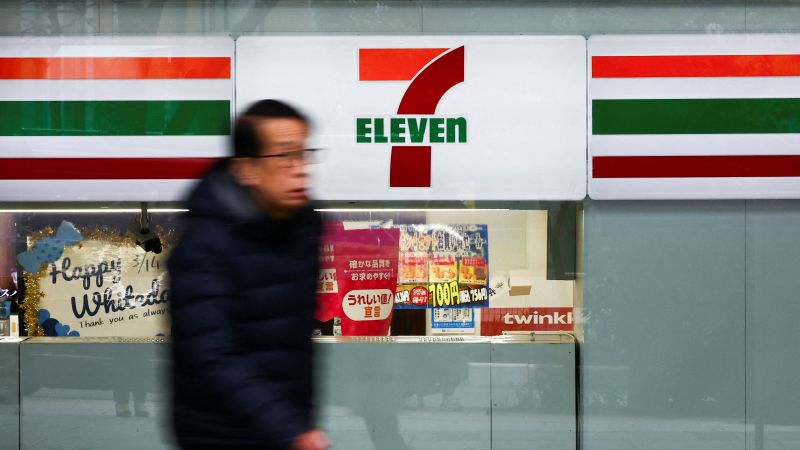Canadian retailer Alimentation Couche-Tard made headlines recently with its decision to withdraw an impressive $47 billion bid to acquire Seven & i Holdings, a highly recognizable Japanese company known for its convenience store chain, 7-Eleven. The surprise move signifies the end of negotiations that could have resulted in one of the most significant foreign takeovers of a Japanese enterprise to date, as Couche-Tard aimed to create a global convenience store powerhouse.
The announcement from Couche-Tard highlighted a perceived lack of productive communication from Seven & i, which they indicated as a primary reason for their decision. In a letter to its board of directors, Couche-Tard expressed frustration, declaring, “There has been no sincere or constructive engagement from 7&i that would facilitate the advancement of any proposal.” They accused the Japanese retailer of engaging in a “calculated campaign of obfuscation and delay,” which ultimately hurt both Seven & i and its shareholders. This lack of transparency and collaboration stood in stark contrast to the public statements made by Seven & i representatives regarding their openness to discussion.
Seven & i, in response, expressed disappointment with Couche-Tard’s decision and insisted that they disagreed with many of the claims made by their Canadian counterpart. The firm recognized the importance of the situation, viewing it as pivotal for corporate Japan’s receptiveness to foreign acquisitions. Following the withdrawal of Couche-Tard’s offer, Seven & i shares plummeted 9% during morning trading in Tokyo, reflecting the market’s concern regarding the future of the company without the merger.
Manoj Jain, a co-founder and co-chief investment officer of Hong Kong-based investment firm Maso Capital, echoed the disappointment surrounding the negotiation’s collapse. He noted the considerable value unifying the two businesses could create and expressed regret for the apparent unwillingness of Seven & i to engage in meaningful dialogue. This sentiment was further echoed by industry analysts, who saw value in the combination due to its potential to streamline operations and enhance profitability.
Couche-Tard had initially raised its offer to $47 billion after several back-and-forth discussions, requesting that Seven & i provide more financial details to facilitate a smoother negotiation process. Reports indicated that the Canadian retailer was also working on a plan to sell some of Seven & i’s stores to address regulatory concerns. Amidst this tension, a counter-offer from the founding Ito family of Seven & i fell through due to financing issues, suggesting that the takeover bid had gained momentum before ultimately faltering.
In a significant revelation, Couche-Tard mentioned that although they had entered a non-disclosure agreement (NDA) with Seven & i, the company’s willingness to share crucial information was minimal. “The quantity and substance of the permitted due diligence…have been negligible,” the Canadian retailer noted, depicting a frustrating experience in trying to engage further with Seven & i’s leadership.
Despite the setbacks, Couche-Tard believed that a merger would substantially increase shareholder value. They proposed acquiring all of Seven & i’s business operations outside of Japan and a 40% stake in the domestic business, emphasizing how critical these convenience stores are as infrastructure during emergencies. However, Couche-Tard indicated that pursuing such a combination was not feasible without a more profound commitment from the leadership of Seven & i.
On their end, Seven & i suggested a different path, proposing that Couche-Tard acquire its international operations in exchange for a stake in the Canadian retailer. Couche-Tard dismissed this option, arguing it lacked the potential to deliver the significant premium it had offered to Seven & i’s shareholders in their original proposal.
In the context of the ongoing struggles Seven & i has faced regarding its financial performance, they have been compelled to demonstrate they can navigate the market independently. New leadership, including CEO Stephen Dacus, who is reported to be the first foreign CEO for the company, is under pressure to enhance earnings. Seven & i has committed to a standalone value creation plan, involving share buybacks and divesting non-core assets.
While the conclusion of the takeover talks with Couche-Tard has raised questions about Seven & i’s capacity to attract alternative bids, investors remain skeptical. As one unidentified investor noted, the drawn-out process and the lack of external interest could suggest an absence of viable options for Seven & i moving forward. The unfolding narrative further illustrates the complexities and challenges inherent in cross-border corporate negotiations, reflective of larger trends in international business dynamics.











